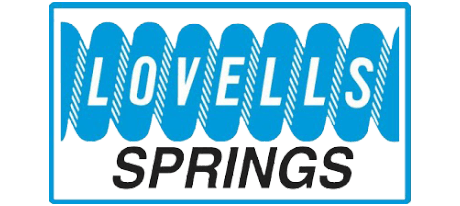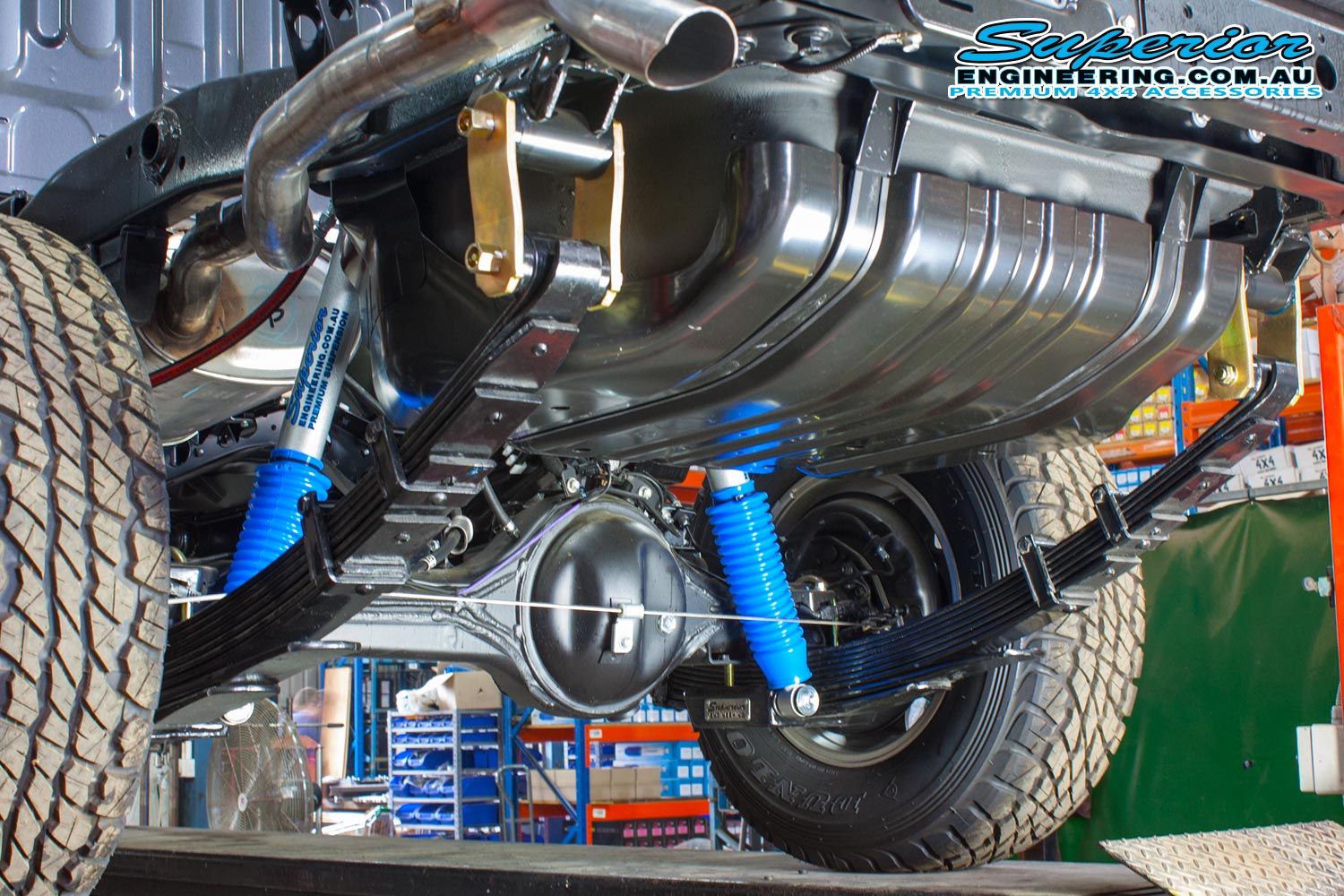Whether you are hooking up the caravan for that big trip, a keen adventurer packing up the 4WD for the weekend, or carrying tools of the trade, your vehicle can easily become overloaded, dangerous, and illegal if it exceeds the manufacturer’s (GVM)

The GVM (Gross Vehicle Mass) is the maximum the vehicle can weigh when fully loaded. Everything you place on or in your vehicle adds to the overall GVM – all accessories such as bull bars and winches, canopies, draws, dual battery systems, fuel, and cargo (including passengers), the tray body for cab chassis models, and even the tow ball load applied by a boat or caravan trailer.
A gross vehicle mass (GVM) is set for all vehicles by its manufacturer and is part of the Australian Design Rules (ADR) approval process. If your vehicle exceeds these limits, it could make your vehicle unsafe, and you could be up for a costly fine if you get caught or even void your insurance.
Lovells GVM Upgrade Kits provide a solution for owners/managers of vehicles who have a need to carry loads which exceed the Original Equipment GVM specifications while at the same time meeting the practical and documentary compliance requirements of Work Safety, Police Licensing, Insurance, Lessors and Fleet Managers.
Lovells hold Compliance Plate Approvals as a Second Stage Manufacturer of GVM Upgrades for Toyota, Nissan, Isuzu, Ford, and Mazda.
Who is a manufacturer?
The term manufacturer has a clear definition in the Australian Design Rules (ADRs), in clause 3 of Vehicle Standard (Australian Design Rule – Definitions and Vehicle Categories) 2005.
The ADRs say that a manufacturer of a vehicle is the person who accepts responsibility for compliance with the ADRs in relation to that vehicle and is issued a compliance plate approval certificate for that vehicle.
The ADRs do not differentiate between OEMs and SSMs (Second Stage of Manufacture).
Based on the definition in the ADRs, Lovells is considered a manufacturer of a vehicle if it accepts responsibility for compliance with the ADRs in relation to that vehicle and is issued a compliance plate approval certificate for that vehicle. Lovells accepts this responsibility as part of its GCM upgrade packages.
Pre-registration GCM upgrades
A vehicle’s GCM is first nominated by the original manufacturer (OEM).
There are various organizations, known in the industry as ‘second stage manufacturers’ (SSMs), that are frequently engaged to upgrade vehicle capacity, prior to first registration. Some SSMs, like Lovells, update the GCM to reflect the change in capacity because of the upgrade.
Lovells believes that when there has been an upgrade to vehicle capacity pre-registration, it is important for any change to the vehicle’s GCM that has resulted from the upgrade to be noted. Lovells believes this is important for numerous reasons, including for accuracy and safety.
Lovells understands that an updated GCM may be specified by a manufacturer and believes it is good practice for manufacturers to do so.
What is the position regarding post-registration upgrades?
When a manufacturer modifies a vehicle that has already been registered, this modification is governed by the various State and Territory authorities and their individual Type Approvals or Modification Codes. Put simply, these upgrades are governed by State and Territory law.
Whether a particular type of modification is available post-registration, therefore depends on the position in the State or Territory in question. Some of the States and Territories have recently changed their position in relation to post-registration upgrades.
GCM upgrades post-registration.
Lovells understands that the current position in relation to GCM upgrades in each State and Territory is as follows:
NSW, SA, VIC and TAS recognize a revised GCM specified by a SSM if endorsed by the inspecting engineering signatory. The signatory must be an endorsed engineer who has access to our Evidence Packages. Endorsed engineers’ contact details are available upon request.
Queensland no longer recognize a revised GCM above the GCM nominated by the OEM. However, on 22 January 2020, Queensland TMR released a statement to the industry that “TMR is exploring options for the issue of a new code that deals with GCM increases. TMR is working closely with Industry on this task, and in particular the Australian Automotive Aftermarket Association (AAAA). Whilst TMR’s priority remains on road safety and national consistency, it is optimistic that a technically sound and separate code-based solution for GCM re-rating can be developed”.
WA, ACT and NT no longer recognize a revised GCM above the GCM nominated by the OEM if the vehicle is modified after first registration.
Is the GVM and BTC upgrade legal in all States and Territories?
Yes. Rest assured, The Federal Dept of Transport have the final say on all Second Stage Manufacturers Approvals and we cover everything and more as required by the ADRs.
How does Lovells ensure that any GCM it nominates is accurate?
Not every SSM can or does nominate a revised GCM.
Lovells does nominate revised GCM capacity figures as a SSM.
Lovells is committed to going above and beyond and believes it is the only SSM that has a full complement of test data and evidence packages to satisfy the December 2019 released GCM and Towing Upgrade Technical Working Group test regime.
This comprehensive new test regime is endorsed by the AAAA, exceeds OEM requirements, and includes the following tests:
- ADR35/05 Testing- Dynamic Braking performance, handbrake performance and gradient starts.
- ADR88 ESC Performance Testing- Sine with Dwell.
- Uprated Axle Assembly Testing- FEA (Finite Element Analysis), lab testing, material testing and CAD modelling.
- SAE J2807 GCM Verification- Driveline and Power train thermal testing.
- SAE J2807 Dynamic Stability testing as a combination. Utilising Lovells test trailer built to SAE standards. This is the only SAE test trailer in the country at present and features include, adjustable draw bar/axle position, adjustable center of gravity, adjustable moment of inertia, load cells on all components, yaw sensors and data acquisition systems, adjustable aerodynamics and frontal area, adjustable weight distribution with rail slides and interchangeable suspension types.
- SAE J266 Understeer testing as a combination.
- VSB6 GCM verification calculations- Start ability and Gradeability.
- Combination Vehicle and Trailer Braking test based on ADR35.
- Towing Upgrade Chassis testing and ADR-62/02 testing.
- Towing Upgrade Hitch receiver load testing and durability/cyclic frequency evidence by an independent DIRDC endorsed Test Facility.
- ADR62/02 Evidence- Mechanical Connections between vehicles.
- Laboratory Report ADR-62/02 – 1200lb Weight Distribution System.
- Dynamic Strength Test Report – Lovells 5T Haul Ace All Terrain Hitch.
- Laboratory Report ADR-62/02 – Static Test AS4177.1 -1200lb Weight Distribution System.
- Laboratory Report ADR-62/02 – Static Strength Test.
- Component Registration 47868 Lovells 5T Haul Ace All Terrain Hitch.
- Component Registration 48275 Lovells 1200lb Weight Distribution System.
- Component Registration 48274 Lovells Tow Bar/Drop Shank.
Has there been a recent change to the law regulating pre-registration GCM upgrades?
There has been no recent change to the law regulating pre-registration vehicle upgrades.
Lovells understands that the longstanding position for many years has been that while the Federal Department does not assess, endorse, or approve GCM upgrades, it equally does not restrict or prohibit GCM upgrades. Lovells understands this longstanding position has not changed.
Importantly, this means that:
Vehicles that Lovells has previously modified are legal in all States and Territories.
Lovells is permitted to plate vehicles with gross vehicle mass (GVM) upgrades and towing capacity upgrades under the approved RVD (as stated in Lovells SSM approvals and as noted on current RVDs).
Lovells is permitted to modify GVM/GCM/towing capacity or variants of these modifications in all States and Territories prior to first registration.
Important information regarding towing and operating at maximum GCM
Due to increased drivetrain operating temperatures at maximum GCM, Lovells recommend engine, transmission/gearbox, transfer case and differential oil changes to be carried out at half the original recommended intervals. Eg. half the interval of the OEM oil changes, eg. from 48 months/200,000 km’s to 24 months/100,000 km’s. Failure to accommodate this may result in premature wear or failure of drive train components which may affect warranty. Constant operation of the vehicle at maximum GVM, Towing Capacity and GCM will reduce the Duty Cycle and life of components, and this must be taken into consideration by the vehicle operator.
Warranty – OE components
Once the Lovells SSM compliance plate is fitted to the vehicle, then Lovells Springs bare full responsibility and will warrant any failure directly associated with the GVM and GCM increase. Please see excerpts from Lovells undertaking in all Overview Documents.
‘IS THE ORIGINAL EQUIPMENT WARRANTY AFFECTED WHEN FITTING A LOVELLS GVM UPGRADE?
As a SSM approval holder, Lovells takes full responsibility for the changes the revised GVM, GCM and the Rated Towing Capacity may have on the duty cycle of the vehicle systems and sub-systems (for example, Brakes, Automatic Transmission, Tow Coupling etc) and any follow-on effect on warranty claims by vehicle owners.
‘Vehicle warranty is not affected when a GVM or BTC Upgrade (Rated Towing Capacity Upgrade) is fitted. Our testing and analysis procedures are stringent and undertaken by an accredited Automotive Engineering Consultants to ensure original equipment components are not compromised. Modifications and load limits are within theoretical service/safety factors to ensure the integrity and longevity of OE (Original Equipment) parts associated with increasing the vehicles load carrying capabilities. As Lovells are a Second Stage Manufacturer, it is our responsibility to document these tests and thus take responsibility for the GVM, GCM and Rated Towing Capacity Upgrades (BTC Upgrades) and their compliance.
Therefore, should an OE (Original Equipment) component fail and be directly attributed/caused by the vehicle carrying loads to a maximum GVM, GCM and Rated Towing Capacity or part failure associated with the GVM, GCM and Rated Towing Capacity Upgrade modification, Lovells will take full responsibility to cover warranty of any failed component after written proof and testing by an independent body has been lodged and confirmed the failure is due to the vehicles increased GVM, GCM and Rated Towing Capacity.
Warranty excludes any component or system which has been identified by the OEM as having a potential failure or problem.
For example:
Toyota Landcruiser LC70 variants:
Toyota has identified an ongoing issue with potential front differential oil leaks on Toyota Landcruiser LC70 variants, (Toyota Technical News Flash TNF-79/19), Lovells SSM warranty excludes any gazetted failure of OEM components. This exclusion includes parts and labour.
Based on Lovells differential testing, CAD modelling and FEA analysis, there is no satisfactory correlation to the potential premature failure of the differential center
securing bolts loosening/breaking as a direct result of Lovells suspension upgrades.
Ford Ranger PX3 2.0 litre bi-turbo:
Based on Ford Customer Service Bulletin released on 4/3/20, Lovells will not assume any warranty or responsibility for transmission failure on the Ford Ranger 2.0 litre engine variant.
Warranty Terms
Coil Springs: 5 year/unlimited km from date of fitment
Leaf Springs: 5 year/unlimited km from date of fitment
Shock Absorbers: 3 year/70.000km whichever occurs first
Platinum Series Shock Absorbers: 4 year/100.000km whichever occurs first
Suspension Components: 2 year/40,000km whichever occurs first
Towing Components: 2 year/40,000km whichever occurs first


